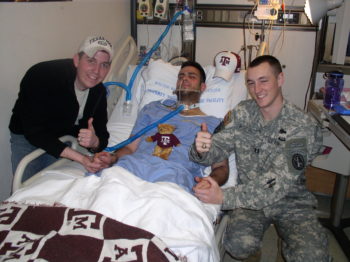Iraq, Afghanistan Veteran Recognized During Graduation
When Maj. Jordan Enger’s jaw was severely damaged in an explosion while deployed with the U.S. Army in Afghanistan in 2007, surprise visits from fellow Aggies at Walter Reed Army Medical Center helped him on his long road to recovery.
Texas A&M University President Michael K. Young said Enger’s story “captures that spirit of Aggie camaraderie and service to the individual that we’re feeling today.”
“He’s agreed to let me tell you this story because it represents the power of the Aggie family and the gesture and the lifelong commitment we have to the success of each other,” Young said.
The Spirit of Aggieland
Enger, a Company D-2 cadet who graduated from Texas A&M in 2002 with a bachelor’s degree in marketing from Mays Business School, was in Khowst, Afghanistan in February 2007 when attempting to shoot a suicide bomber before his vest detonated. When the bomber’s vest detonated, a ball bearing struck Enger, blowing out the lower portion of his jaw and five of his teeth.
After he regained consciousness, he realized doctors would have to cut off his beloved Aggie Ring that he wore on tours to Iraq and Afghanistan before surgery. With his face bandaged and unable to speak, he slipped it off his finger and handed it to a friend with a nod and the understanding that he would return it to him.
When Enger eventually woke up in the ICU, his jaw was wired shut and a tracheostomy in his throat. On a note pad, he asked nurses where his father was, and they told him he was stuck in Atlanta due to a snow storm, preventing his flight to Washington D.C.
Enger was alone for another day while he was stabilized in ICU, but the next morning, nurses told Enger that two “friends” had stayed overnight in the waiting room. Minutes later two Fish Camp and Company D-2 buddies entered the room.

Enger said the Aggies Jonathan Murphy, a platoon leader in Old Guard in charge of the Tomb of the Unknown Soldier, and Dustin Green, a government official, gave him comfort in his time of need.
“When I saw them walk in I started to cry,” Enger said. “I was alone and scared before they got there. Dustin and I weren’t close as cadets. In fact we fought and I hated Dustin. I wrote on a piece of paper ‘Dustin, Why are you here? We never got along.’ Dustin replied, ‘because when we were fish we made a promise to always be there for each other no matter what.’”
Enger said when Green noticed he didn’t have his Aggie Ring, Green removed his own ring and put it on Enger’s finger.
“Jonathan and Dustin each held my hand and sang the ‘Spirit of Aggieland’ to me and stayed by my side until my Dad got there,” Enger said. “If they hadn’t been there I don’t know what would have happened.”
Enger said his stay at Walter Reed was “dominated by the Aggie Spirit.” His doctor was an Aggie who played the Aggie War Hymn on the operating room speakers during his first surgery. He was also visited by Aggie Congressmen Rep. Chet Edwards, Class of 1974, and Rep. Louie Gohmert, class of 1975, who was also a “D-2 Dog” in the Corps of Cadets. Before Enger was discharged, he said he received a visit from Secretary of Defense Robert Gates, who served as Texas A&M’s president from 2002-2006.
Continuing to serve
Enger was able to make a full recovery, and although he was supposed to be medically retired in 2007 after his injury, a mentor convinced him to become a company commander at Ft. Hood.
“He tried to persuade me and said that he could see that I loved soldiers, and that I had a lot of potential and needed good leaders, but that I was lacking good mentorship,” Enger said.
Enger had initially insisted on getting out of the Army on medical retirement, but had a change of heart.
“A couple months went by and I talked it over with friends and family who were convinced that this was God speaking to me with a second chance,” Enger said.
Enger eventually made a full enough recovery two years after his severe injury to redeploy to Iraq where he took command of 90 soldiers for the 2009-2010 deployment in support of Operation Iraqi Freedom. Fifteen months later he was selected to command a second company of 225 soldiers, and another year after that he was selected for an Army fellowship to attend Rice University on full scholarship for an MBA program, where he met his wife Amanda. After graduation they were married and he was stationed at Ft. Riley, Kansas.
“When I was injured I had a massive amount of tissue damage and they essentially had to reattach my tongue,” Enger said. “As a result my airway, according to my doctors, had anatomically changed and created sleep apnea that was so severe the Army would not allow me to redeploy anymore. As a result I was finally medically retired.”
By the end of his military career, Enger retired with one Bronze Star Medal, one Purple Heart, and three Meritorious Service Medals from three combat tours: Iraq from 2004-2005, Afghanistan from 2006-2007 and Iraq a second time from 2009-2010.
A source of support
Enger, now a commercial real estate broker, and his wife now live in Houston with their son Jason, who is named after Jason Fetty, the soldier who tackled the suicide bomber that so severely damaged Enger’s jaw and injured eight others.
Despite all the progress in the more than 10 years after his injury, Enger continues to struggle with sleep apnea and insomnia.
“I haven’t slept the same or gotten really good sleep since my injury on February 20, 2007,” Enger said. “I still see a therapist for PTSD on a weekly basis, and I’m not ashamed to share that as I think most combat veterans could use the help. I was always honest with my soldiers about my struggles as well so they knew they could get help and not be ashamed.”
Enger said after getting injured and going through a such traumatic event, he decided to stop drinking and get help. He has been sober for 11 years.
“I always try to help others, especially veterans who may have turned to alcohol and drugs to deal with traumatic events they have witnessed,” Enger said.



